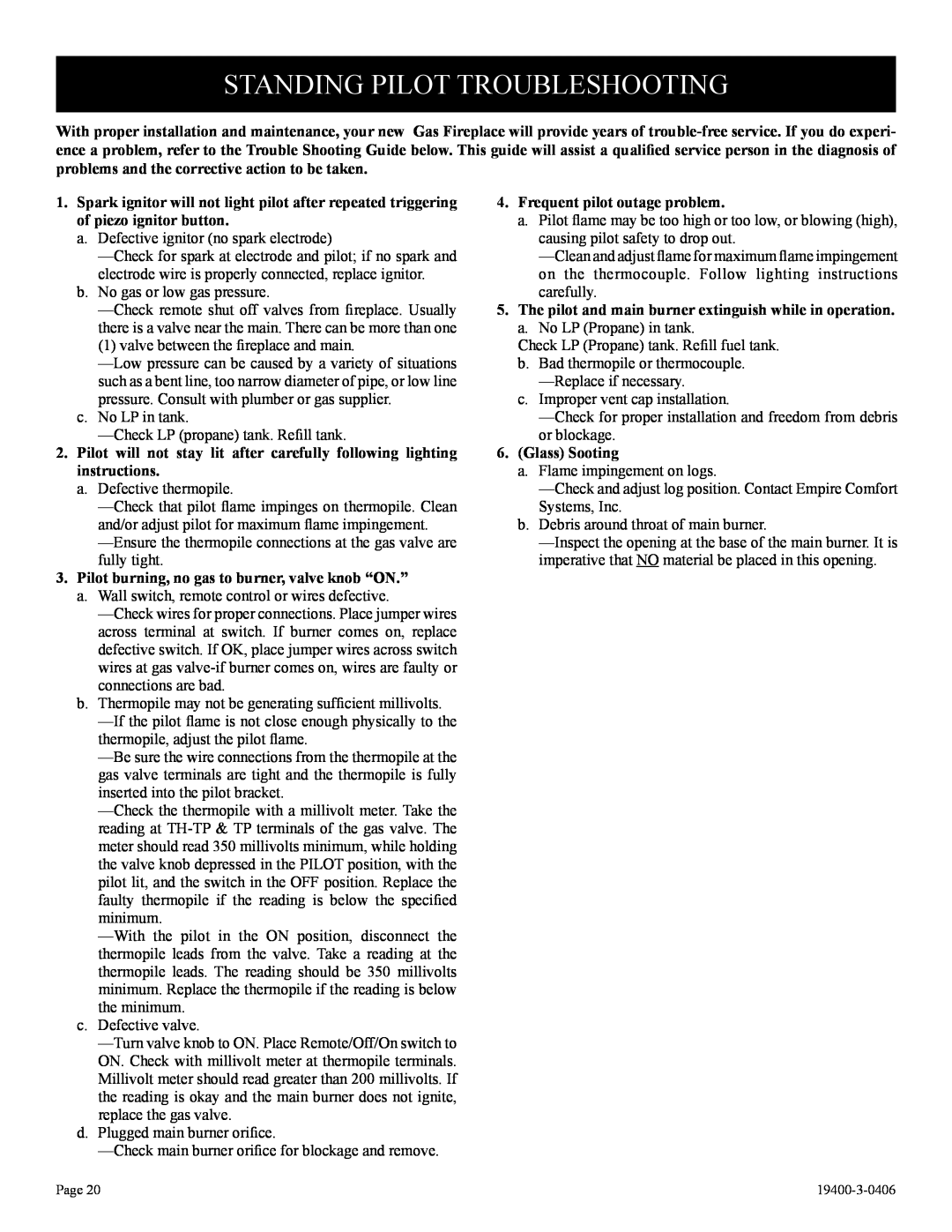1.Spark ignitor will not light pilot after repeated triggering of piezo ignitor button.
a.Defective ignitor (no spark electrode)
—Check for spark at electrode and pilot; if no spark and electrode wire is properly connected, replace ignitor.
b.No gas or low gas pressure.
—Check remote shut off valves from fireplace. Usually there is a valve near the main. There can be more than one
(1) valve between the fireplace and main.
—Low pressure can be caused by a variety of situations such as a bent line, too narrow diameter of pipe, or low line pressure. Consult with plumber or gas supplier.
c.No LP in tank.
—Check LP (propane) tank. Refill tank.
2.Pilot will not stay lit after carefully following lighting instructions.
a.Defective thermopile.
—Check that pilot flame impinges on thermopile. Clean and/or adjust pilot for maximum flame impingement. —Ensure the thermopile connections at the gas valve are fully tight.
3.Pilot burning, no gas to burner, valve knob “ON.”
a.Wall switch, remote control or wires defective.
—Check wires for proper connections. Place jumper wires across terminal at switch. If burner comes on, replace defective switch. If OK, place jumper wires across switch wires at gas valve-if burner comes on, wires are faulty or connections are bad.
b.Thermopile may not be generating sufficient millivolts. —If the pilot flame is not close enough physically to the thermopile, adjust the pilot flame.
—Be sure the wire connections from the thermopile at the gas valve terminals are tight and the thermopile is fully inserted into the pilot bracket.
—Check the thermopile with a millivolt meter. Take the reading at TH-TP & TP terminals of the gas valve. The meter should read 350 millivolts minimum, while holding the valve knob depressed in the PILOT position, with the pilot lit, and the switch in the OFF position. Replace the faulty thermopile if the reading is below the specified minimum.
—With the pilot in the ON position, disconnect the thermopile leads from the valve. Take a reading at the thermopile leads. The reading should be 350 millivolts minimum. Replace the thermopile if the reading is below the minimum.
c.Defective valve.
—Turn valve knob to ON. Place Remote/Off/On switch to ON. Check with millivolt meter at thermopile terminals. Millivolt meter should read greater than 200 millivolts. If the reading is okay and the main burner does not ignite, replace the gas valve.
d.Plugged main burner orifice.
—Check main burner orifice for blockage and remove.
4.Frequent pilot outage problem.
a.Pilot flame may be too high or too low, or blowing (high), causing pilot safety to drop out.
—Clean and adjust flame for maximum flame impingement on the thermocouple. Follow lighting instructions carefully.
5.The pilot and main burner extinguish while in operation.
a.No LP (Propane) in tank.
Check LP (Propane) tank. Refill fuel tank.
b.Bad thermopile or thermocouple. —Replace if necessary.
c.Improper vent cap installation.
—Check for proper installation and freedom from debris or blockage.
6.(Glass) Sooting
a.Flame impingement on logs.
—Check and adjust log position. Contact Empire Comfort Systems, Inc.
b.Debris around throat of main burner.
—Inspect the opening at the base of the main burner. It is imperative that NO material be placed in this opening.

